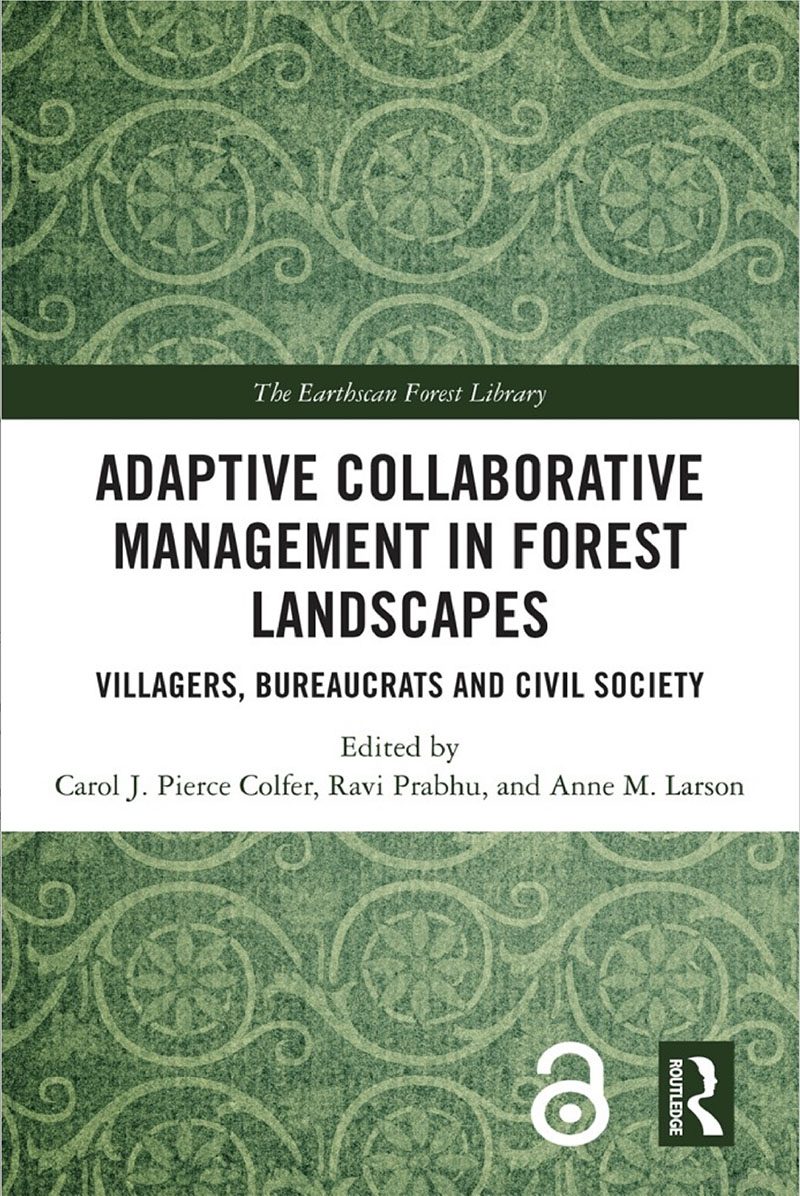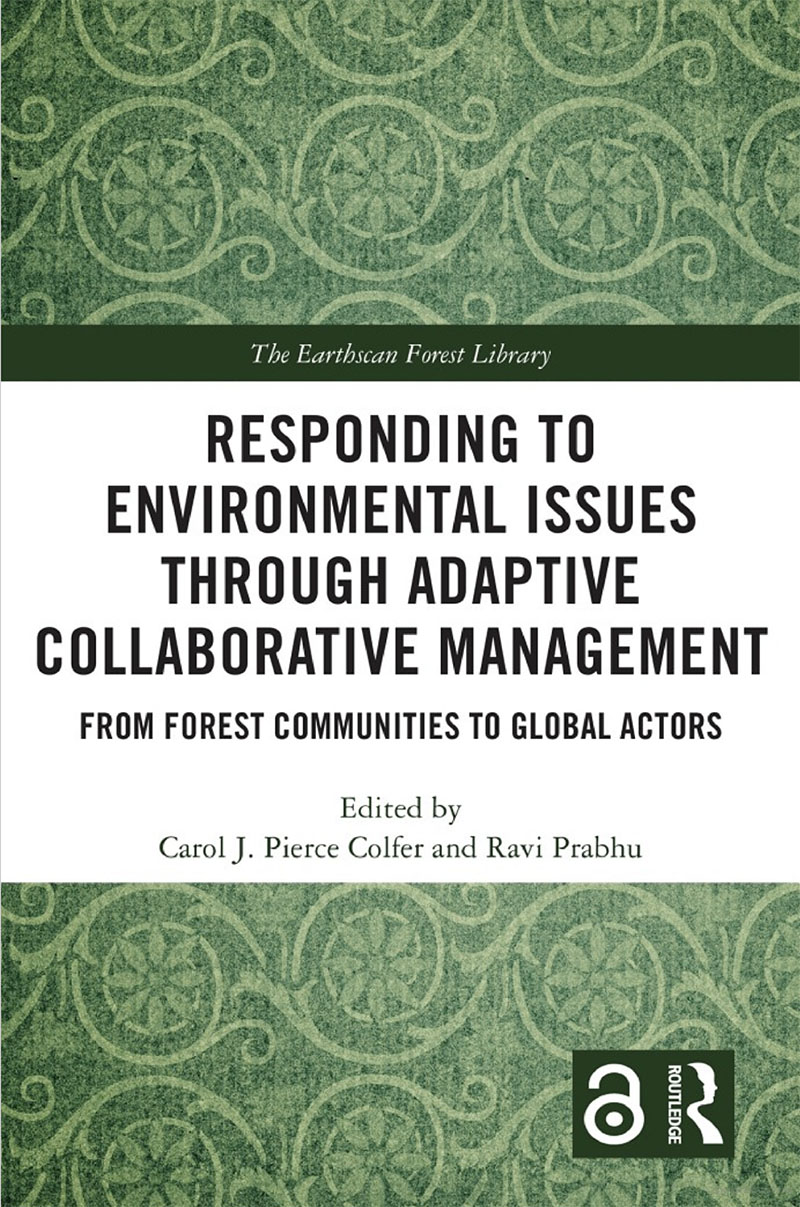An account is required to join the Society, renew annual memberships online, register for the Annual Meeting, and access the journals Practicing Anthropology and Human Organization
- Hello Guest!|Log In | Register
The Process of Developing Two Recent Books on Adaptive Collaborative Management (ACM) of Forests
Carol J. Pierce Colfer
It all started in June of 2020, in the early days of COVID. Maybe the enforced solitude was what provided the time to ponder. I began to wonder about the CIFOR (Center for International Forestry Research) project we’d begun in the late 1990s. We’d been so excited at the prospect of developing an approach that might allow forest managers to effectively incorporate the knowledge, practices, and goals of local communities into their processes. We believed that for a conservation/development process to endure, it would have to take into account existing site-to site variety -- ecological, economic and sociocultural; and it would have to include actions and plans that local people had a strong voice in determining, that they genuinely wanted. What we came up with was ACM - characterized by conscious iterative efforts among stakeholders to communicate, collaborate, negotiate and seek out opportunities to learn collectively about the impacts of their actions; and from my perspective, all within the context of their own worldviews, practices, and desires.
I’d wondered before about what had happened on our sites, but this time, I hunted down the emails of as many of our original team members (originally 90 in all), and simply asked if any would be interested to write about what they’d learned in the interim that might help us to improve (or reject) ACM as an approach. I suggested return visits to their field sites, new tools that they’d found helpful, observations on the process, failures and successes. I stressed that we should capture what we could learn from our experience.
To my amazement, within a few weeks, I’d received abstracts for 22 papers. I realized I would need help with this process, so invited Ravi Prabhu, forester and co-developer of our original concept, and later Anne Larson, a political scientist, to join as co-editors. We made a good team, with my Southeast Asian experience, Ravi’s South Asian and African, and Anne’s Latin American work. Thus began the long slow process of planning, drafting, editing, revising, and finally publishing two exciting volumes. Given the open-ended nature of my initial query, we received quite a range of topics; and the varying speeds with which authors produced their analyses meant iterative and evolving structures for the books.
 The first book, Adaptive Collaborative Management of Forest Landscapes: Villagers, Bureaucrats and Civil Society, came out in early 2022 (London: Routledge). Global in scope, it included both analyses from participants in CIFOR’s original program (in the early 2000s), and subsequent uses of the approach by Anne Larson and Esther Mwangi’s teams in Uganda and beyond (e.g., Bomuhangi et al., Mukasa et al., both focusing on gender), in the mid-2010s. James Johnson and Benno Pokorny had adapted the approach for work in 17 South American countries. Building on that experience, they developed a unique chapter, from the perspective of an imagined villager participating in the ACM process. Mutimukuru-Maravanyika et al. analyze a complex project in Zambia from the perspective of teamwork and interdisciplinary communications. Several chapters focus on multi-stakeholder forums in various countries (Cronkleton et al. and Sarmiento Barletti). A valuable investigation of power and its functioning is provided by McDougall and Ojha, based mainly on experience in Nepal; and Fisher and Jackson consider how action research and activism intersect.
The first book, Adaptive Collaborative Management of Forest Landscapes: Villagers, Bureaucrats and Civil Society, came out in early 2022 (London: Routledge). Global in scope, it included both analyses from participants in CIFOR’s original program (in the early 2000s), and subsequent uses of the approach by Anne Larson and Esther Mwangi’s teams in Uganda and beyond (e.g., Bomuhangi et al., Mukasa et al., both focusing on gender), in the mid-2010s. James Johnson and Benno Pokorny had adapted the approach for work in 17 South American countries. Building on that experience, they developed a unique chapter, from the perspective of an imagined villager participating in the ACM process. Mutimukuru-Maravanyika et al. analyze a complex project in Zambia from the perspective of teamwork and interdisciplinary communications. Several chapters focus on multi-stakeholder forums in various countries (Cronkleton et al. and Sarmiento Barletti). A valuable investigation of power and its functioning is provided by McDougall and Ojha, based mainly on experience in Nepal; and Fisher and Jackson consider how action research and activism intersect.
 The second volume, Responding to Environmental Issues Through Adaptive Collaborative Management: From Forest Communities to Global Actors (London: Routledge, 2023) was edited by only Colfer and Prabhu. Larson’s other duties had multiplied and the remaining chapters focused on Sub-Saharan Africa and Indonesia (outside her area of specialization). Developing country researchers dominated in development of the chapters, the slower speed reflecting the more difficult contexts in which they typically write (less reliable internet, electricity, and equipment; more difficult access to scholarly literature; more unreliable transport; more illness to interfere with their work; and usually English as a second language). More of them were also able to revisit their original field sites, adding time-consuming new research to their tasks. Besides the revisits (by Yuliani et al. and Liswanti et al. on Sumatra, Fisher et al. on Sulawesi, and Kozanayi et al. on Zimbabwe), Kusumanto et al. provide a ‘thought experiment’ on the use of ACM processes to address flooding in Jakarta. Hagmann et al.’s chapter, building particularly on experience in Zimbabwe, provides guidance on how to facilitate well – a critical skill in conducting ACM. Two chapters (by Kamoto et al. and Egunyu) examine the institutionalization of ACM-like policies in Malawi and Uganda, respectively. The conclusion, building on the many observations of local successes as small islands within larger seas of disaster, discusses the idea of implementing Stewardship Economics -- a concept that acknowledges and rewards existing and evolving environmental stewardship -- in concert with a strengthened ACM that a) links communities still more meaningfully with broader scale actors, and b) implements ACM-like processes of collaboration and learning at broader scales as well.
The second volume, Responding to Environmental Issues Through Adaptive Collaborative Management: From Forest Communities to Global Actors (London: Routledge, 2023) was edited by only Colfer and Prabhu. Larson’s other duties had multiplied and the remaining chapters focused on Sub-Saharan Africa and Indonesia (outside her area of specialization). Developing country researchers dominated in development of the chapters, the slower speed reflecting the more difficult contexts in which they typically write (less reliable internet, electricity, and equipment; more difficult access to scholarly literature; more unreliable transport; more illness to interfere with their work; and usually English as a second language). More of them were also able to revisit their original field sites, adding time-consuming new research to their tasks. Besides the revisits (by Yuliani et al. and Liswanti et al. on Sumatra, Fisher et al. on Sulawesi, and Kozanayi et al. on Zimbabwe), Kusumanto et al. provide a ‘thought experiment’ on the use of ACM processes to address flooding in Jakarta. Hagmann et al.’s chapter, building particularly on experience in Zimbabwe, provides guidance on how to facilitate well – a critical skill in conducting ACM. Two chapters (by Kamoto et al. and Egunyu) examine the institutionalization of ACM-like policies in Malawi and Uganda, respectively. The conclusion, building on the many observations of local successes as small islands within larger seas of disaster, discusses the idea of implementing Stewardship Economics -- a concept that acknowledges and rewards existing and evolving environmental stewardship -- in concert with a strengthened ACM that a) links communities still more meaningfully with broader scale actors, and b) implements ACM-like processes of collaboration and learning at broader scales as well.
Because our goal was to spread the word about what worked and what didn’t – recognizing the difficulty so many practitioners have with integrating local communities meaningfully -- we really wanted these books to be widely and freely available. We were able to obtain sufficient contributions via the Consultative Group on International Agricultural Research Centers’ (CGIAR) ‘Policies, Institutions and Markets’ (PIM) and ‘Forests, Trees and Agroforestry’ (FTA) programs for the first volume. The second volume was more of a struggle, but eventually we received small contributions from the East-West Center in Honolulu, CIFOR-ICRAF, Cornell University, and again PIM. But we were still short. In the end, by arguing that CIFOR was in a developing country, we were able to persuade Routledge to grant us the 50% price they offer to developing country institutions (not authors, of which we had 42 from developing countries in this second volume, but institutions).
For myself, the whole process has been a delight. It has been wonderful to be back in touch with one-time team members, many of whom I’d rarely interacted with since the end of our work together in the mid-2000s. I was thrilled that they/we had learned so much of value that others could apply, that they had developed so fully into mature and capable professionals (many had been enthusiastic junior researchers in the early 2000s); that we could learn what had happened on those sites where we’d all poured so much of our passion and effort; and that we could learn about others’ efforts to apply our earlier ideas. I hoped for the future we could entice more anthropologists (we did have some, including myself, the team leader), deepening our understanding of local realities still further.
And now, I have turned to another kind of ‘revisit’, for which perhaps I can persuade readers to help me. I found a manuscript I’d written in 1978 about a rural American school (K-12) I’d studied in the 1970s. I’d changed professions away from the anthropology of education at that time and had totally forgotten about its existence. But I found that it was a good intersectional analysis focusing on gender, age, and social classification. I realized that this was the environment in which today’s adult American policymakers had been enculturated. What were the effects of this kind of schooling --- rigid about time, emphasizing competition, age-graded, dismissive of women and ‘lower classes’, among other things --- on international policymaking? If you have experiences that might help me understand such interactions, I’d love to hear them (cjpcolfer@gmail.com).

Cart
Search